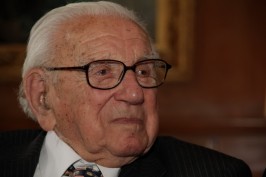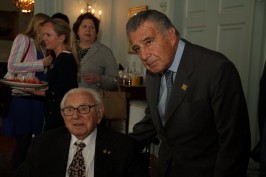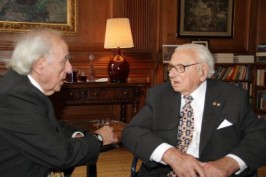On 27 June 2013 the International Raoul Wallenberg Foundation honored Sir Nicholas Winton, English Holocaust savior that turned 104 last May. During Second World War Winton rescued and saved from certain death more than six hundred Jewish children from Czechoslovakia condemned by the Nazis to perish at death camps.
Winton received the Raoul Wallenberg Centennial Medal in a special ceremony held at the Embassy of Sweden in London with the presence of former Prime Minister, Gordon Brown. Eduardo Eurnekian and Baruch Tenenbaum, Chairman and Founder of the educational NGO, presented the award.
In his speech, Eurnekian said: “Sir Nicholas Winton risked his comfortable position as a stockbroker and began an operation that any sensible person would have qualified as impossible. Few people deserve the Nobel Peace Prize more than Sir Nicholas Winton”.
The story
In 1938 Nicholas Winton (19 May1909) worked as employee at the Stock Exchange in Maidenhead, Berkshire .
A few days before Christmas, Winton was finishing details of a holiday trip to Switzerland . He was young, made a great amount of money and could allow himself to do it. However, a simple telephone call prevented him from going skiing in the Alps . That was a call that would change the course of his life, forever.
His friend Martin Blake, who worked for an adult help committee in Czechoslovakia, partially invaded by the third Reich, was asking for help.
Winton traveled on his own to Prague, he stayed at the Sroubek hotel in Wenceslas Square and after a few days working with his friend he realized that there were no specific plans to save the lives of children.
He immediately contacted the Refugee Children’s Movement (RCM) in London , a movement that gathered Jews, Quakers and many Christian groups. The mission of this organization was to locate the lodging and money that the British government required as warranties to approve the entry of European refugees, persecuted by Nazism and in virtue of a law passed weeks before Winton’s journey to Czechoslovakia .
On November 21, 1938, shortly after the “the night of the broken glass”, the House of Commons of the UK had taken, with the support of Prime minister Neville Chamberlain, Chancellor Lord Halifax and Minister of the Interior, Sir Samuel Haare, a measure that would permit to receive refugees younger than 17 years old as long as they had a place to stay and when 50 pound sterling (about U$S 1,500 nowadays) were deposited as warranty of the payment of the return ticket due to an eventual return of the refugee to the origin country. A similar initiative was not successful in the US Congress, resisted by the powerful anti-immigration lobby.
Winton started then a frenetic task, he knew time was running against him. The Nazis had occupied the Sudetenland , a land belonging to the Czech Republic historically claimed by Germany.
The rumor of the “Englishman of Wenceslas Square” spread and soon a great amount of parents approached to try to include their children on the list that would put them safe from the Nazi advance. “It was exasperating”, later said Winton, “each group felt it was the most urgent one”.
Throughout nine months he tried to evacuate 669 children from the Wilson station in Prague, on trains to London. Among them was Karel Reisz, renowned film director, author of the awarded movie “The French Lieutenant’s Woman”. Today it is believed that there are more than 5,000 children of the so called “Winton children”, who descend from the ones saved by Winton.
A ninth train with 250 children was supposed to leave on September 3, 1939 but that was the day when the UK declared war on Germany. The train did not abandon the station and the children were not seen anymore.
“We had 250 families waiting for the children at the train station on Liverpool Street, in London. Had the train departed a day before it could had reached its destination”, recently said Winton.
After six decades, the British Crown acknowledged the humanitarian actions of the great man, by granting him the title of Sir of the Crown.
“I kept in secret what I did, even to my family, and I am not going to speak of that until the official announcement is made public”, was Winton’s comment when he knew that his name was on the list of the honorary positions published each year by the Queen.
Vera Gissing, a girl saved by Winton, wrote her biography and elaborated the script for the film Power of Humanity. “He rescued most of the Jewish children of my generation in Czechoslovakia . Not many of us could reunite with our parents: they perished in the concentration camps. If we had not been separated from them, we would have died too,” said Vera.
On September 2001, in Prague, he was the guest of honor of the President of the Czech Republic, Vaclav Havel, to attend the presentation of the film of his story.
- Baruj Tenembaum y Nicholas Winton.
- Sir Nicholas Winton y Baruj Tenembaum
- Nicholas Winton y Gordon Brown.
- Baruch Tenembaum y Nicholas Winton.
- Baruj Tenembaum y Nicholas Winton.
- Sir Nicholas Winton y Eduardo Eurnekian.
- Baruch Tenembaum, Sir Nicholas Winton y Eduardo Eurnekian.
- Nicholas Winton y Eduardo Eurnekian











